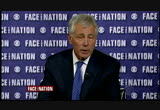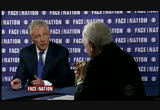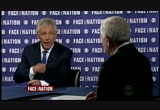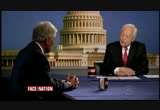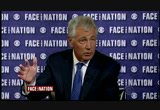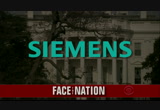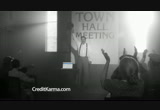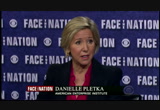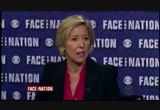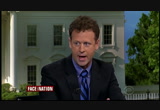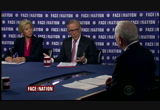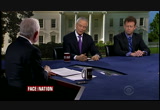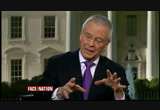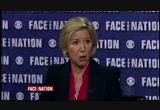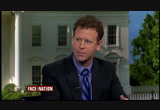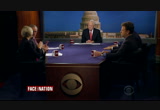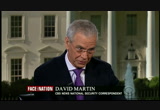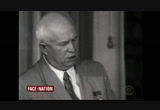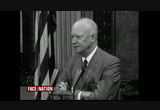tv Face the Nation CBS March 2, 2014 5:00pm-5:31pm PST
5:00 pm
>> schieffer: welcome back to "face the nation," page two. one irony of this week, the ukraine story broke just after secretary of defense hagel had announced plans to scale back the american military. we're going to pick up the interview. i want to talk to you about the military budget that you outlined. you want to reduce the size of th army to the smallest size since before world war ii. how do you reduce the size of the american military without making it look like, to the people around the world, that we're somehow retreating, that we're withdrawing from all of this. >> you start, bob, with the reality of where we are in the world today. this budget that is the first budget in 12 years that's not a budget based on war footing.
5:01 pm
we've been at war for 1 years constantly. two wars. we're out of one war, iraq. and we're coming out of the longest war we've ever been, afghanistan. not unlike after every war the united states has been in, you reset your posture. you reset your assets. you reset your whole enterprise based on the new realities and based on preparing that institution for the challenges of the future. to answer your question, how do you adjust to the dangerous complicated world that we're in, we've increased, for example, cyberassets. increased special operations. we're focusing on readiness, capability. our capacity. our ability to do the things that we need to do in the strategic interests of the strategic guidance that the president laid out in 2012. >> schieffer: you say we're coming out of two wars, yes, that's true.
5:02 pm
but we're not necessarily coming away victories just coming out of those wars, the enemy is still out there. >> of course the threats are out there. of course the threats are shifting. cyberis a good example. five years ago there wasn't the same focus the reality of what a cyber attack could do to this country, paralyze this country without any nation firing a shot, about knowing where it comes from. special operations. the terrorist threat that still is around the world will be with us i suspect for some time. we've got to figure out how best we do that. the strategic priorities that we've laid out based on the president's strategic guidance plan first defend the homeland. second, continue to build capacity in securing our world through our alliances, through our treaty obligations, through our commitments all over the world. not retreating from the world.
5:03 pm
we're still going to be there. also defeating aggression in the world and winning a war against any adversary anywhere in the world. that hasn't changed. but how you do it, bob, how you do it is always going to be adjusted to the realities of the time and challenge. >> schieffer: but you're not suggesting that we have won these wars, we have to recalibrate the way we continue to fight them. >> at the peak of iraq we had 150,000 troops in iraq. the peak of afghanistan probably around 120,000. those are big numbers. we don't need those as you go forward the same way we did the last 1 years. you've got to adjust your force posture. by the way, it isn't me cutting the budget. it's the congress' decision on sequestration. it isn't secretary of defense or the president doing this, i think we should clear that up a
5:04 pm
little bit here, too. where are we making decisions and how do we make them, that's responsibility i have. but also the physical constraints that are being placed on the pentagon to make very tough choices here are very significant. what we're talking about is gradually reducing our active duty strength by about 10%. i don't think that's an astoundingly large cut as we adjust -- we're still going to need a big army. >> schieffer: let me ask you about something that your critics are saying, they say that because you're proposing cuts in benefits, tax breaks, eliminating, slowing down pay raises for some of those on military duty that you are in fact trying to balance the budget on the backs of these people who fought these wars. >> well, first of all, that's just not true. we're not making any recommendations on any retirement changes we're going
5:05 pm
to wait until the retirement commission was was impaneled if we need to do anything on retirement. this isn't just an arbitrary, unilateral approach to trying to slow the growth just to slow the growth. we've got to look at the long term commitments to our people. half of our budget today in the pentagon goes to pay compensation retirement and medical care. that will increase significantly. we're not cutting, we're proposing slowing growth in certain areas. tax cuts, we're not cutting anybody taxes. we're asking for specific considerations. in areas where we are slowly, eventually reducing the growth of pay increases. there will still be pay increases. other areas, we think these responsible, we don't think it breaks faith with our people. but we have to reset,
5:06 pm
reposition, i've got to be able to keep a modern military. those coming in behind me, the technological edge that made our military the envy of the world along with everything else, best led, best trained, best equipped, best educated. we want to sustain that for our own interest and for our people. >> schieffer: you can see more of our interview with secretary hagel plus response from new york democrat who is not happy with some of the positions he has taken especially on sexual assaults in the military. you can see all of that on our website at facethenation.com. we'll be back in one minute with more on the ukraine. predicting the future is a pretty difficult thing to do. but, manufacturing in the united states means advanced technology. we learned that technology allows us to be craft oriented.
5:07 pm
5:08 pm
the latest developments on the crisis in ukraine. nato officials are now holding an emergency session in brussels to discuss the latest developments in russia at least 10,000 people marched in a pro invasion rally through the streets of downtown moscow. we're joined again by david ignatious of the "washington post," along with daniel pletko of the american enterprise institute, david martin we asked him to stay back and we're also joined by michael o'hanlan of the brooksings institute. daniel, you heard, you heard secretary kerry and secretary hagel, we heard a lot of developments here this morning what did you make of what the secretary said this morning? >> i thought the secretary's rhetoric is very strong. the president's rhetoric was strong, the problem is that you have to match strong rhetoric with strong actions. i don't mean military actions but i do mean decisive message to the russians mr. than just words that is going to stop them
5:09 pm
in their steps. stop them not only from moving further in to crimea but moving in to the rest of ukraine. >> schieffer: well, he had some strong words there. he said, he talked about the g8, these various things they can do, what can you do beyond that? >> there war lot of options for the united states and nato allies. first of all there are economic sanction, is that we can put the sanctions that we took off of 'ron on russia, maybe banking sanctions, we can isolate the russian economy. another important thing we can do is free up start selling gas to europe, something that the russians have been earning a great deal of money on and we, the united states, you now not doing. i think there are numerous nonmilitary options for us out there. the problem is i don't think that the president right now is very credible. and i think that putin thinks he's got obama's number. so he's going to do what he wants do do and dare the president for the next step. >> schieffer: michael, what is your take on secretary kerry
5:10 pm
this morning? >> thought he was very good. overall point i'm a little more relaxed about this than most people for couple of reasons. first of all, as bad as what putin may be, he hasn't killed people. and i think he's trying to show force in way that gets specific task done. he wants his base and i don't admire that approach, it is sort of 19th century. it's spot surprising for the way great powers behave even in this century. on top that have we do have pretty strong set of potential economic sanctions and putin knows it. we've gotten better at applying sanctions largely because of the iran experience. we know how to go after the banking sector and visas and personal accounts of leaders in russia if we need to. if this really escalates to a very bad kind of thing, which it hasn't yet, but if it got in to civil war fair and invasion by russia to back up one side and ukraine these kind of tools would be applied and applied
5:11 pm
effectively and putin knows it. i'll relatively confident he won't go there. >> schieffer: i want to pick up on something you said awhile ago, when you come around, this is putin's problem. it's not the problem of the west. obviously it has repercussions for the west. give me more detail on that. >> if we look back several months we see that putin has been facing a rebellion on his border. in ukraine which is country of absolutely crucial strategic poshes to russia and many russians feel deep kinship, where the orthodox church was born. we've seen a movement turning west toward europe, putin tried to buy off the government of president yanokovich offering $15 billion to turn away from this invitation from the eu then you had a movement of thousands of people in the streets risking their lives to say, no, that's not the future that we want. we do have to remember that the
5:12 pm
prelude to this crisis is key strategic ally of russia urning it's back. with all of the dynamics the last several days in kiev and capital of ukraine you still have the successor government, an anti-russian government, calling to the u.s. for support, looking west to europe. i think the big choices, putin has to decide how much he wants to risk. how much he wants the put on the table. europe has to decide whether it's really willing to stand behind the people of ukraine in what will be a very expensive effort to pull them from russia towards europe. if russia offered $15 billion, couple times that anyway is going to be the cost of this effort. >> schieffer: david, obviously this -- nobody planned it to happen this way but the fact that the administration decided to unvail its plans to
5:13 pm
scale back and kind of redesign the american military, it happens at the first of the week then all of this happens toward the end of the week. does the fact -- the question that i asked secretary miguel, you know, how do you do that. i think everybody knows we have to redesign the military, but how do you do that without leaving the impression that we're withdrawing from the world and we're not aiming to be the kind of force we once were. >> well, first place even if the plan were to keep the army at its peak of 516,000 which what it was at the height of afghanistan and iran. the plan to go down to 450,000 would not change your options in place like ukraine, the map
5:14 pm
dictates those options. but you still have the perception that you're going to smaller force. it's not just a smaller force, because the further we get away from iraq and afghanistan the less battle hardened the force is going to be. last time i was down in fort bragg, 16,000 of the 20,000 soldiers in the 82nd airborne were combat veterans. five years from now when army is smaller that's not going to be the case. i think the army's plan, the pentagon's plan is to keep deplowing units to places like africa for relatively small operations but to show that the u.s. is still in the game. look, if you were to take this vast, complex subject of defense strategy and defense budget and boil it all down in to a bumper sticker, it would be, no more
5:15 pm
land wars in far off lands. that's what the president is determined with this budget. >> schieffer: well, danielle, what about that. there does seem to be a perception in some parts of the world that the united states is stepping back. >> i think there is perception at this table that the united states is stepping back not just some parts of the world. look, one of the reasons that you have large and capable and multi-faceted military not to fight, it's so you don't have to fight. that deterrent power is being diminished substantially. i'm hearing from inside the pentagon that we're going down to numbers as low as 380,000 after the 450,000. these are numbers that will make it impossible for us to engage not just in large scale wars in one place but in small case conflicts. people like vladimir putin know it. that the why it's so important for us at the end of the day on previous conversation to ensure that things don't escalate in places like ukraine because the
5:16 pm
truth is that we lost a lot of our deterrent power. >> schieffer: michael? >> i'm comfortable with the 450,000 that i shared danielle's concern where this could go next. if sequestration kicks back in even the 2015 budget which is dangerously close to sequestration unless the increase that obama and hagel are requesting actually happens. this is a prescription for getting the army down to 400,000 active duty soldiers. a lot of numbers, it's hard to grasp at what point you get to new threshold of capability. let me put two missions on the table. we need to deter another korean war. they have ten nuclear weapons. some people think that have as acronyms particular. deterrence in korea is as important. you want the capability to handle that conflict along with our south korean allies. secondly, be ready for the smaller missions, i guess there are lot of other possible ones. everything from residual force
5:17 pm
in afghanistan, what if we do get israeli-palestinian peace. what if we ever do get peace deal in syria, seems off the charts now. but we go at this place month up. that may require international peacekeepers including some americans. on the list, 450 is okay, we go much lower i start to get very worried. >> schieffer: we haven't talked about in the pacific and what happens there. we're talking about a pivot toward the pacific but as i understand it, secretary hagel also talking about reducing the number of ships in the navy. can we do that? >> a big part of his defense guidance was to say that he wants to build fewer, what are called literal combat ships which were in truth, region that he wants -- he thinks chinese threat is more potent than these ships are not strong enough, well armed enough. i think if secretary hagel was to give his budget speech of last monday today after the
5:18 pm
events in ukraine and crimea it might have a slightly different tone. it's not as if difference between 450,000 or 425,000 troops is the key signal. it's the way in which the united states backs up its statements so that they're credible. looking at this situation, president obama does have credibility problem. talks about red line in syria for chemical weapons then let's -- says that russia will have to pay costs if it intervenes in ukraine then within hours, military intervention begins. at some point this issue of credibility and having the force and resolve to use it i think is crucial for the administration. >> i think what you just said about syria is exactly right. we decided not to go in to syria because there was an agreement that syria would give up its weapons and they have given up as yet 11%.
5:19 pm
they were supposed to have given them all up, the fact that they are plotting this a message that the president is sending to the rest of the world which is, we're really not that interested in compliance, this is a storm that's blown over. these things do have implications, it's part of the reason that putin doesn't take us seriously as he ought to when secretary of state comes out with a strong statement. because it's not backed up with the follow through. that's the risk that we run in all of these places. >> schieffer: david, what are they most worried about at the pentagon, you're there every day. >> in terms of the budget what they're worried about is that sequestration is still the law of the land start can in 2016. all of these cuts we've been talking about are just the beginning of really deep cuts if sequestration comes back in. but i'd like to just respond to
5:20 pm
the thing about putin not taking us seriously. we had hungary in '64, georgia in 2008. when the soviet union or russia feels like the countries on its periphery are threatened, it takes action. i don't think it really is determined by who is in the white house. >> we don't have policy that russia allowed to have -- that was the soviet policy at the end of the day if we're willing to tolerate the notion that russia has to dominate its neighbors we have to ask ourselves where that stops. if we're willing to tolerate the notion that russia somehow has a say over where there's a russian minority, even substantial one, when we're looking at countries that are frankly part of nato. countries that we have obligation to defend. we need to be decisive here so that they're not encouraged to go further.
5:21 pm
>> schieffer: all right. i think we're going to end it there. we could probably talk all afternoon, maybe all have lunch or something. very enlightening, thanks to all of you on a very serious and important weekend. we'll be right back with a controversial "face the nation" interview, straight up of the cold war. [dad] [laughs]
5:22 pm
5:23 pm
>> schieffer: no story has gotten more attention over the last half century than america's relationship with russia. in fact it was that story that produced "face the nation's" biggest and most controversial scoop. >> "face the nation," through the eyes of cbs news film cameras located for the first time inside the kremlin in moscow. >> schieffer: it was june 2, 1957, "face the nation" was going to make history. after two years of negotiations, producers managed to book the very first television interview with soviet leader nakita kruschev. >> we have many questions that we want to put to you through your interpreter i'm very sure
5:24 pm
that you must have many answers to give us which will be of great interest to millions of americans. >> schieffer: those of those answers proved unremarkable but what made front pages around the world was the simple fact that khruschev had never been seen had been seen and heard in america's living room. >> i can prophesy that your grandchildren in america will live under socialism. >> schieffer: with cold war tensions running high some government officials accused cbs of putting out communist propaganda. secretary of state refused to watch. even president eisenhower staunch internationalist suggested it was a phony exercise. >> we know that there are no prepared questions here and no prepared answers. it is a matter of trying to be honest with each other putting it on the -- in the papers and on the radio and in the television screens.
5:25 pm
and this other performance was far from that. >> some in congress even called for laws to keep foreign leaders off television unless the government gave permission, but cbs president frank stanton stood by the interview and became to be known as milestone establishing that broadcasters had the same right as newspapers to report the news without government interference. back in a moment.
5:28 pm
>> schieffer: that's it for today. we want to thank you for joining us. be sure to tune in to tonight's cbs evening news and tomorrow to cbs this morning for the very latest on this crisis in the ukraine. for "face the nation" i'm bob schieffer. we'll be back here next week. see you then. captioning sponsored by cbs captioned by media access group at wgbh access.wgbh.org
5:30 pm
against a possible attack. good evening, i'm ann notarangelo. and i'm brian hackney. a tense day. ukraine begins to mobilize against a possible attack. good evening. thousands rallied against the russian military seizure after russia gives the green light to a possible military intervention. they warn quote wor the brink of disaster. the world is
224 Views
2 Favorites
IN COLLECTIONS
KPIX (CBS) Television Archive
Television Archive  Television Archive News Search Service
Television Archive News Search Service  The Chin Grimes TV News Archive
The Chin Grimes TV News Archive 
Uploaded by TV Archive on

 Live Music Archive
Live Music Archive Librivox Free Audio
Librivox Free Audio Metropolitan Museum
Metropolitan Museum Cleveland Museum of Art
Cleveland Museum of Art Internet Arcade
Internet Arcade Console Living Room
Console Living Room Books to Borrow
Books to Borrow Open Library
Open Library TV News
TV News Understanding 9/11
Understanding 9/11
